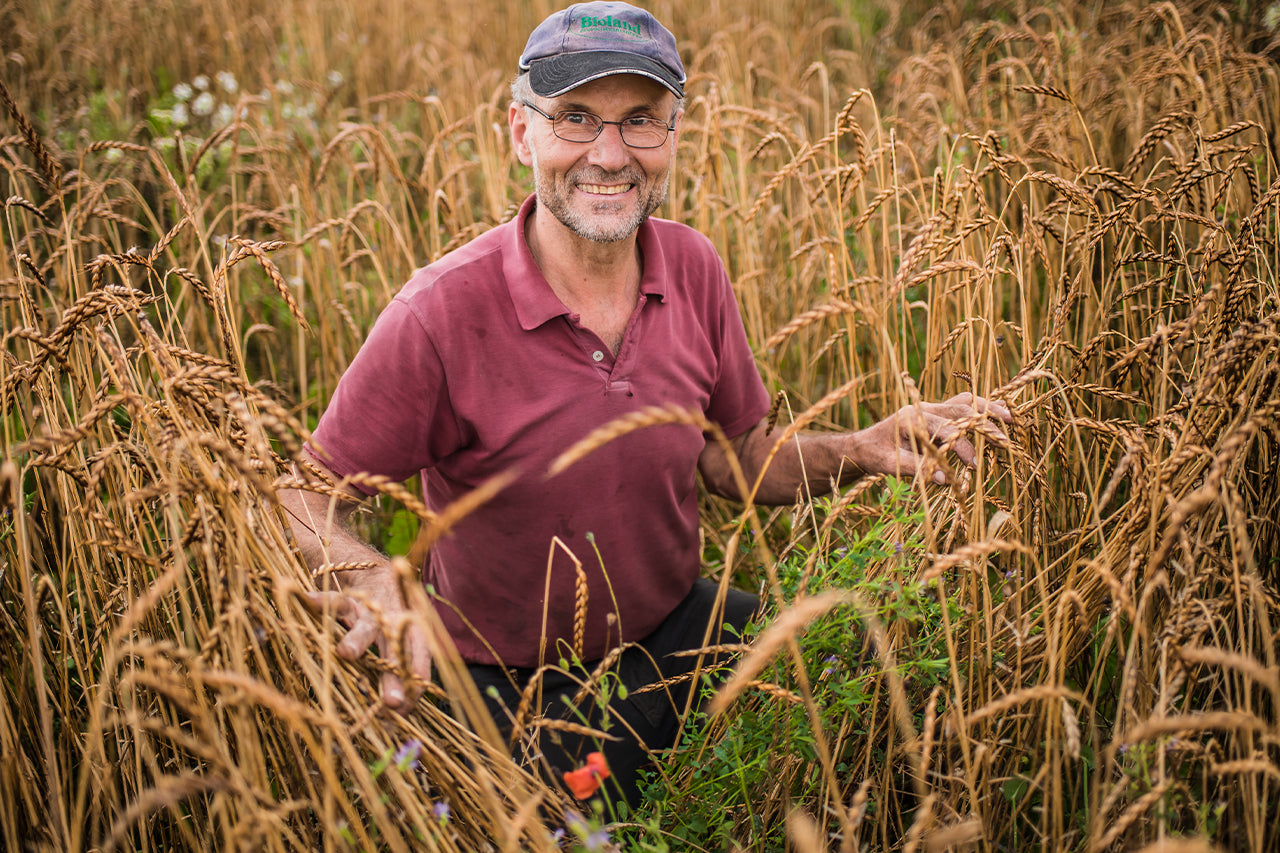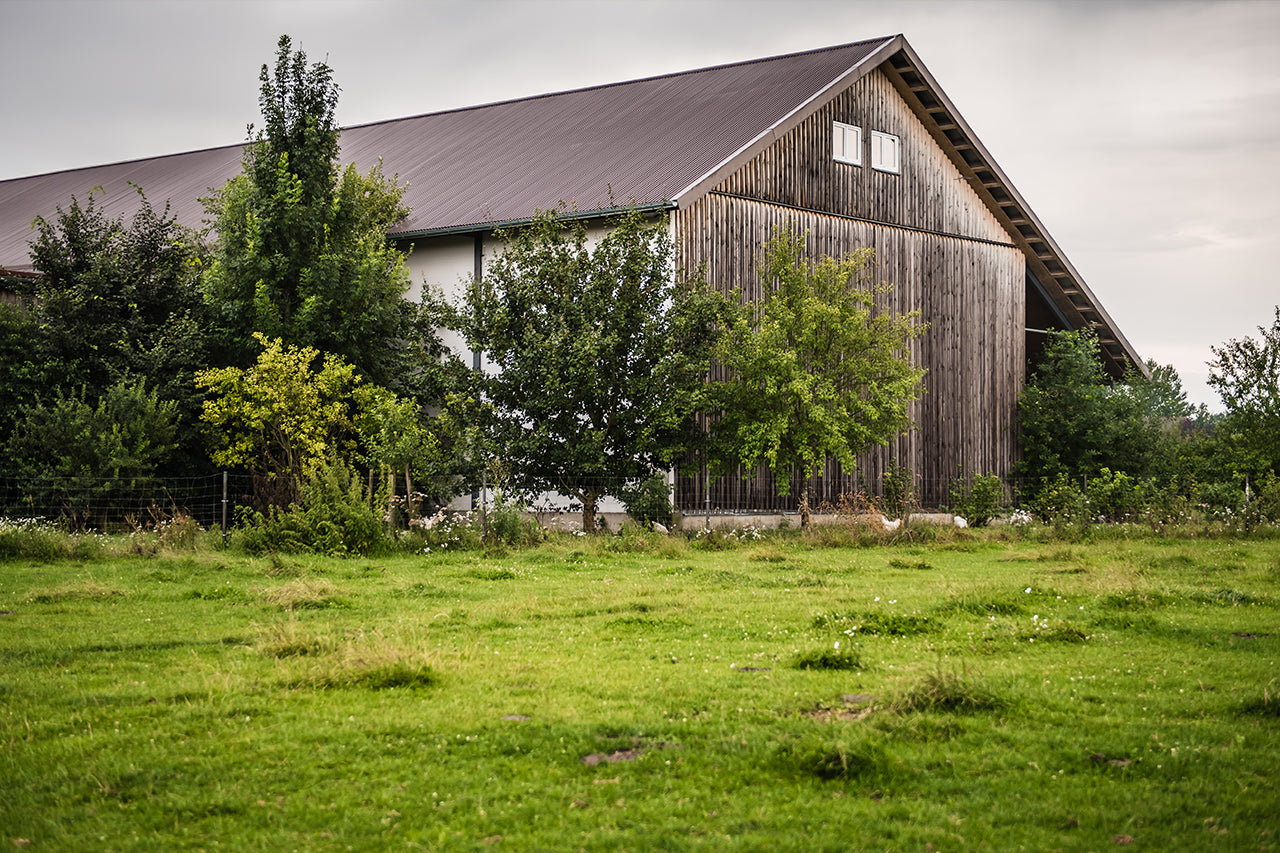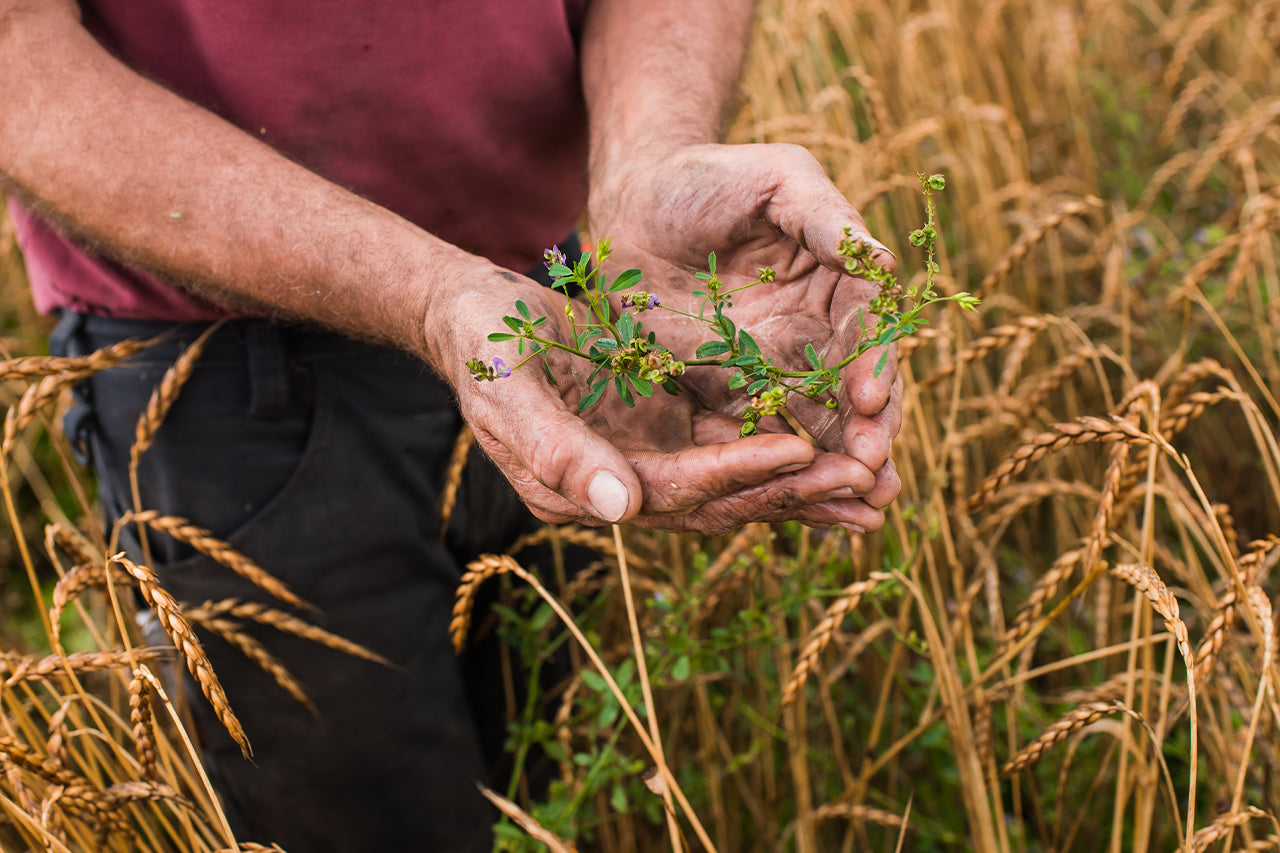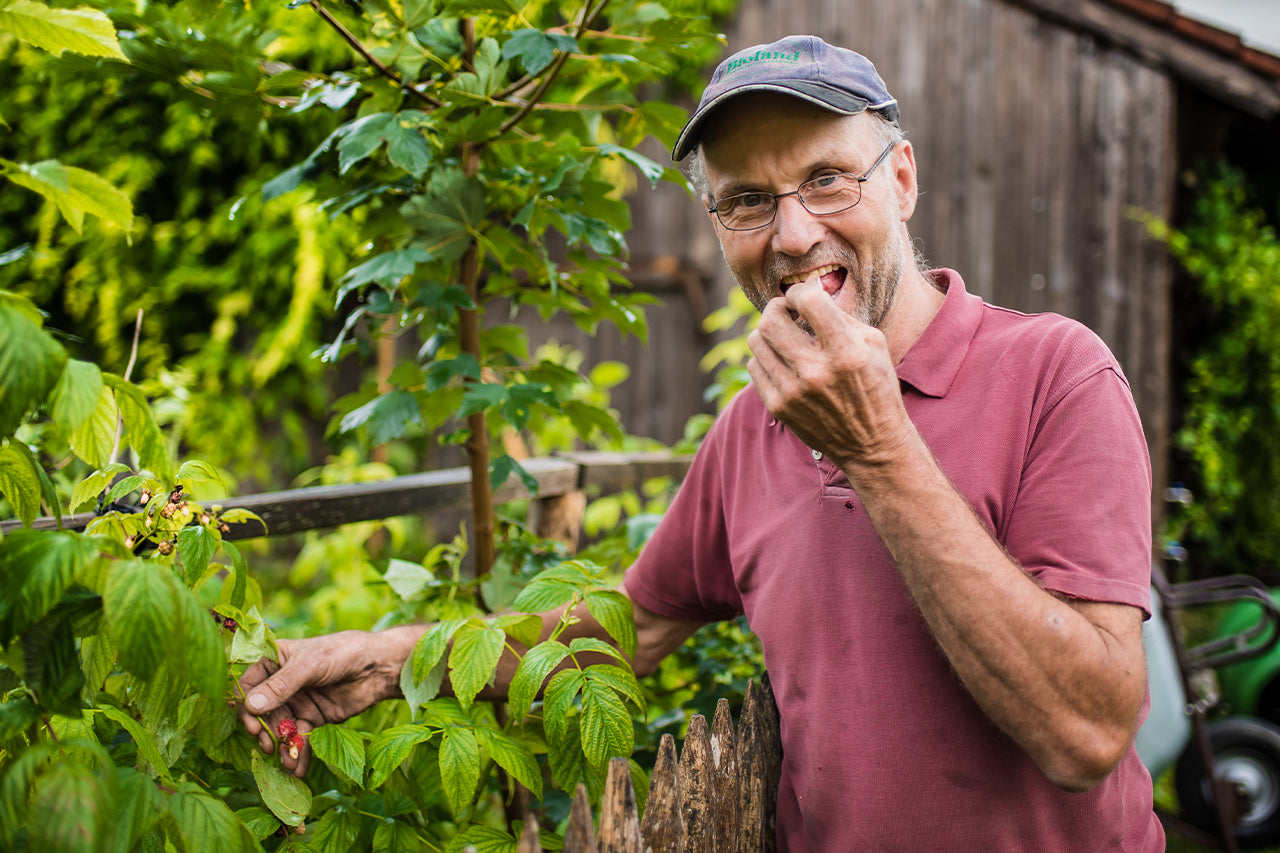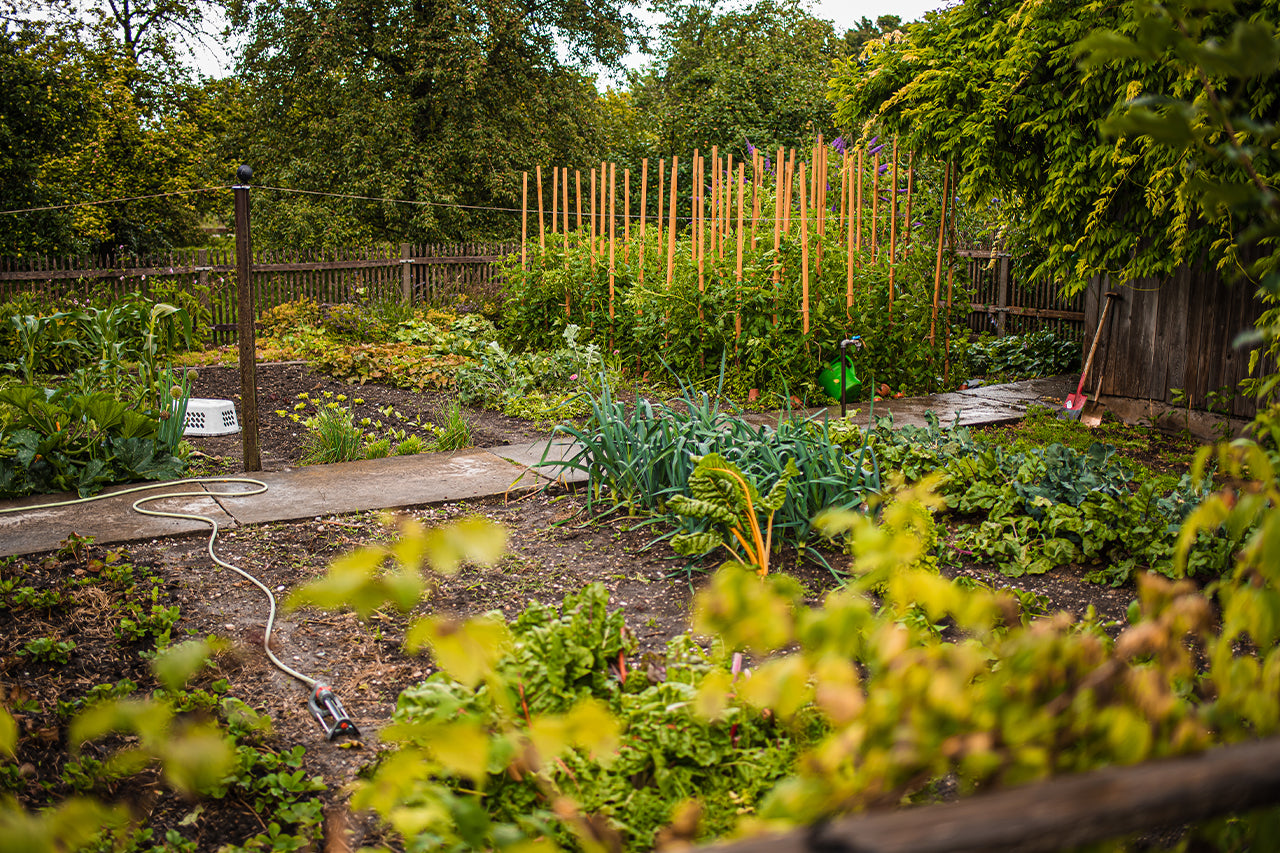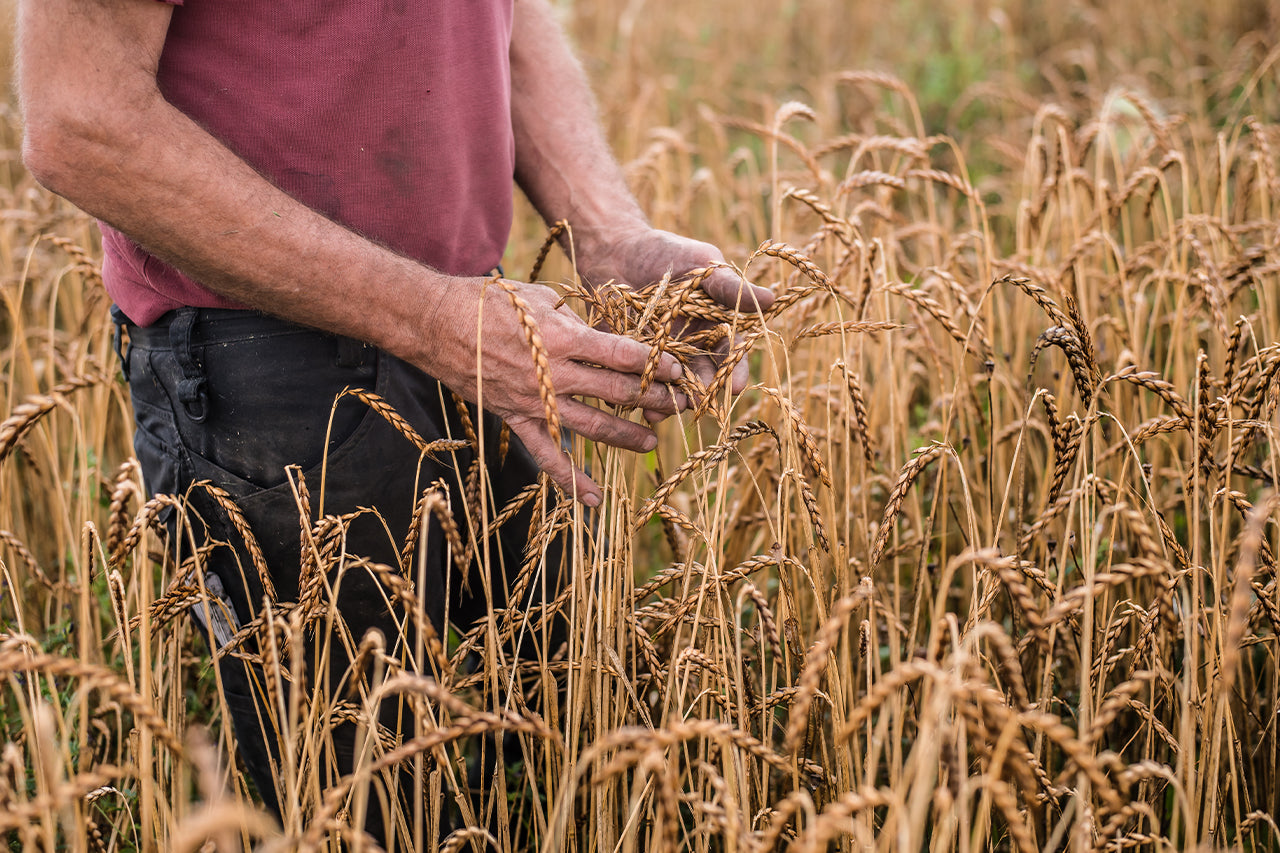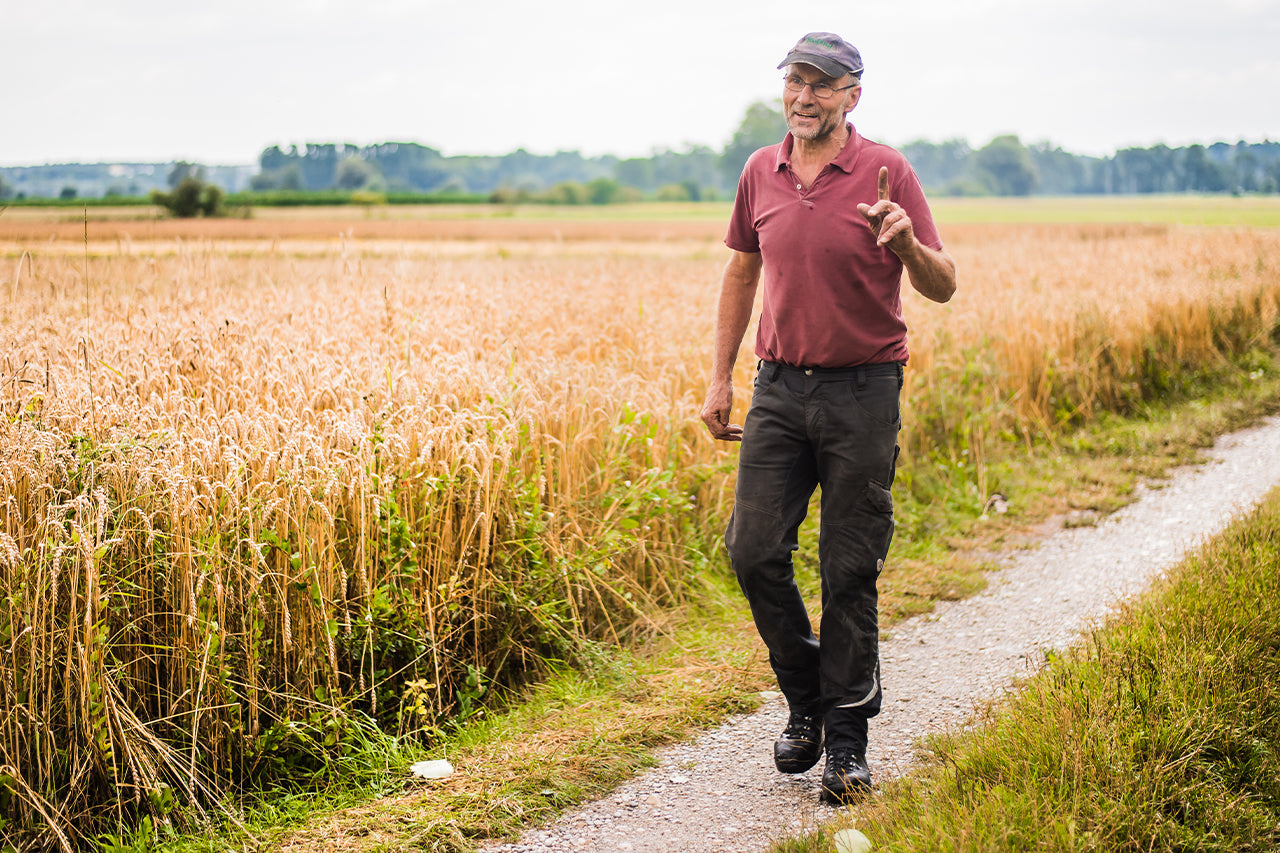"I want to be a free farmer - without dependence on agricultural policy!"
With Sepp Braun we visit a real icon of organic farming in Bavaria.
Many media - from GREENPEACE MAGAZIN to SPIEGEL - have already reported about him, the eco-filmmaker Bertram Verhaag ("The Farmer and His Prince") has made a well-respected documentary about him called "The Farmer with the Earthworms", on which EXPO in Milan he was appointed soil ambassador and his colleagues speak of him with the utmost respect.
And that's right, after a short time of the conversation we also realize that this reputation is no coincidence. What Sepp Braun, a charismatic and at the same time engagingly down-to-earth man, has to tell is interesting, captivating, fascinating. He combines intensive observations of nature with current research, he thinks and works in cycles. Soil and plants, people and animals, nature and climate – Sepp considers nothing in isolation, everything is connected and belongs together. We could listen for hours...
The farm is now run by daughter Johanna and son-in-law Simon Reiter.
"BIOLAND is my spiritual home.", explains Sepp Braun,
is the deputy BIOLAND state chairman and has been managing the farm together with his wife Irene since 1988 according to the organic-biological guidelines of the cultivation association. He cultivates crops on 37 hectares of a total of 54 hectares. Dairy farming, energy production (photovoltaics and wood gas) and, most recently, chicken husbandry are other mainstays of the farm. "I am part of the Barnhouse Regional project because I am convinced that farmers, processors, trade and fellow human beings must work together again to ensure that we humans treat ourselves and nature fairly and in partnership." , explains Sepp, who grows oats for us. "I feel Barnhouse's excitement to walk this journey with us." But Sepp wouldn't be Sepp if he was satisfied with that. And that is also the reason for our visit today.
ORGANIC SEEDS: NOT A MATTER OF COURSE
Today's event focuses on oat seed - namely seed from biodynamic breeding. This is not something that can be taken for granted: because even if oats are grown according to ecological guidelines, the seed for them does not come from completely organic breeding - because this simply does not exist to date. As an organic farmer who thinks holistically, this is absurd for Sepp Braun. “Breeding organic seeds is a socio-political challenge!” he says with conviction. "And if the state doesn't take responsibility here, then we'll just have to do it ourselves." It goes without saying that Barnhouse is actively and financially involved (...but more on that later).
For years he has selected oat varieties himself
– with the aim of developing their own variety. Finally, he got in touch with the Dottenfelderhof (Bad Vilbel), which conducts research and breeding in its own agricultural school based on purely biodynamic aspects. dr re. of course Ben Schmehe is the main person responsible for oat breeding there and came today especially to tell us and other farmers from the Barnhouse Regional project about his work. He also wants to show us the white oat from his ecological breeding, which is already growing on Sepp's "Barnhouse field" on an experimental basis. We are excited!
THE FEATURES OF “BARNHOUSE” OATS
After a brief welcome and introduction, our group walks from the farm across to the barnhouse field. It's a very hot July day and the summer warmth brings out the scent of the fields wonderfully. Ben Schmehe clearly explains the special features of this very special oat. In conventional cultivation, chemical stalk shorteners are used to inhibit growth despite high fertilizer application. This reduces the risk of stem breakage and storage (crooked position, for example due to heavy rain) of the grain and makes harvesting easier.
However, this oat is remarkably long-stemmed. The advantage: the long stalks take the light out of unwanted plants in the field and thus regulate the culture in a completely natural way.” In addition, long stalks produce a lot of straw – a valuable resource,” Ben Schmehe explains another benefit. The animals in the stables of the organic farmers are happy about this natural bedding. Also of great importance: Oats have very good natural resistance to loose smut, a dreaded cereal disease.
The different points of view are clearly evident here: what is seen as a hindrance and risk in conventional farming is used as a welcome feature in organic farming. "The goal of our work is grain that is inherently resilient," Schmehe makes clear. A goal that will probably not please the seed giants. And it's almost there, because the "Dottenfelder Hafer" is currently already in the officially prescribed seed registration (only approved seed may be traded in Germany). Sepp Braun is visibly happy about the success and presents us with his ripening ears: "It is important to me that the variety is vital and healthy. And you can see that in this oat!”
THE FIELD AS A BEEE PASTURE
Then he draws our attention to the second special feature of the Barnhouse field - a flowering mixture as an undersown. And what we wouldn't have noticed so consciously before, we can now see: all kinds of flowers and herbs are growing between the densely packed ears of oats. A “living” field. And there is no comparison, for example, with a conventional corn field on which, thanks to the intensive use of herbicides, nothing, absolutely nothing, grows between the individual corn stalks. "We farmers have a responsibility for the environment and the climate." , Sepp makes it clear to us. “The underplanting is extremely important as food for the bees. And it is true medicine for the soil." In times when not a few bee colonies are starving because they simply cannot find enough food in areas characterized by conventional agriculture, this is of great importance.
This is where Sepp's way of thinking becomes clear again: working with nature instead of - as is usual in conventional agriculture - fighting with it and often against it. The farmer has been working without a plow since 1988 and has only practiced minimal tillage since 1994 in order not to compact the soil and to protect the soil layers. “Only good, living soil can create good conditions for plants to thrive in the long term and thus ensure global nutrition.”
HEALTHY SOIL – HEALTHY PEOPLE
Up to 350 earthworms cavort on one square meter of natural field. In contrast, only about 18 of the enormously useful creatures are found in soil compacted by conventional agriculture. Of course, this also reduces the soil's ability to store CO2 or absorb water, which is so important for our climate. For the organic farmer, the recent floods in Lower Bavaria are also due to the compacted soil, which is no longer able to absorb the amount of water from heavy rain.
Sepp's philosophy and work can be summed up as follows: Healthy soil is the basis of agriculture and is therefore an indispensable prerequisite for healthy plants, healthy animals and ultimately healthy people. And we're amazed at how obvious that is. And how the "modern" agricultural economy, which is geared towards pure yield, permanently ignores this...
THE BARNHOUSE VISION: THE THREE-BENEFIT FIELD
Sepp picks a panicle from the oat field for us: camelina – an ancient cultivated plant that is slowly regaining its importance, mainly due to organic farming. “The false flax is ideal as an underplanting.” he explains. "It's a so-called 'cavalier' because it doesn't grow taller than oats." In addition to its importance as an oil plant, camelina is a very good soil conditioner and immensely valuable for the bees during the flowering period. An approach that inspires us and that we will continue to pursue with our Barnhouse regional project: A "three-benefit field" that combines ecologically grown organic oats with the possibilities of an underplanting useful for nature and humans in one area. We are hooked and we are certain that together with Sepp Braun, Ben Schmehe and our partner farmers we will still be able to make a difference here.
BARNHOUSE AS SEED PIONEER:
ON THE WAY TO THE FIRST ORGANIC SPRING OAT VARIETY
After returning to the farm, we strengthen ourselves with a small snack and enjoy a presentation by Ben Schmehe and his important breeding work (picture below: the test field on the Dottenfelderhof). The Dottenfelderhof is the only initiative in Germany that breeds spelled oats according to the guidelines of biodynamic or ecological agriculture. It is repeatedly established how important it is to breed under the conditions under which later cultivation also takes place.
Currently, the seeds of all oat varieties that are grown organically come from conventional breeding. These are either medium or even highly susceptible to loose smut. The only reason why seeds are not withdrawn is that seed production usually takes place under conventional conditions (including the appropriate sprays and dressings). Only the last propagation stage of the seed takes place under ecological conditions. After that, the seed is considered organic and can be sold to organic farmers.
So far, there is no organically bred variety in the world - but thanks to the work of the Dottenfelderhof, that will soon change. Since the development and registration of oat varieties is very time-consuming and expensive, Barnhouse, as already mentioned, supports and accompanies this seed project financially from 2016 to 2018 with €15,000 a year. A necessary funding to clear the final hurdles for seed approval. And a worthwhile investment in the further development of organic farming. As an organic pioneer, we are very pleased that we can also be actively involved as an “organic seed pioneer”.
EXCURSION: Breeding and seed production, conventional and organic. Where exactly are the differences and demarcations here? We interviewed Ben Schmehe – you can find his answers here .
A TOUR OF THE FARM THAT IMPRESSES US
Inspired and with heads full of ideas and plans, we let Sepp give us a brief tour of the property. Farm dog Sina is of course eager to help (and tirelessly brings us her “stick”...). Sepp's regard and respect for nature and fellow creatures, animals, can be felt and experienced everywhere. The dairy cows stand relaxed in a barn that was planned together with behavioral biologists to meet the animals' requirements. They are completely free to choose between stable and pasture. The cows watch us attentively as we enter, while the pigs, lying lazily on the straw next to them, ignore us sleepily. At the other end of the stable is Sofie, the farm cheese maker, who prepares the delicious Dürneck raw milk creations.
Sepp proudly shows us the newest farm residents:
his chickens. “I just wanted to try it!” he says with a mischievous smile. With his own intuition and empathy, as well as his trust in nature, he takes a very relaxed approach to keeping chickens and has deliberately ignored possible obstacles and risks. We take a look at the “Chicken Kindergarten”, a mobile barn: The fluffy chicks of the “Les Bleues” breed, a dual-purpose breed, cavort here – male chicks are not sorted out here as uneconomical.
The "big" hens can look forward to two light-flooded stalls made of wood , which also inspire us: the brown "New Hampshire hens" live in one stall, the white, blue-footed "Les Bleues" in the other. The chickens approach us with great curiosity. The large stalls are divided into two and have a kind of conservatory where the animals can scratch to their heart's content or groom their feathers in their own dust bath. Some are so dusty and mousy afterwards that we thought they were a separate breed.
Outdoors, the hens find shelter in an "agroforest," a long group of trees and shrubs. We are amazed to learn from Sepp: “Crows are also at home in the trees. And these protect the chickens from the birds of prey.” Another example of the organic farmer's work with nature.
We are also amazed at the chicken feed used by Sepp. The animals receive seeds that have been germinated on the farm (which, by the way, look just as appetizing as the sprouts that we mix into the salad at home). No wonder the chickens are all beauties on this wholesome, vibrant diet! Sepp calmly accepts the fact that he has to sell a Dürnecker egg well above the usual market price with this type of chicken farming. As we know, his priorities lie elsewhere.
With a lot of impressions we say goodbye to Sepp Braun. Again we learned something new and learned something new. Again we are filled with respect for the achievements of the organic farmers, who deliberately chose the more difficult path. And we are happy to have a visionary in Sepp Braun on board our regional project. With great confidence as far as the future and development of organic farming is concerned, we start our journey home.


